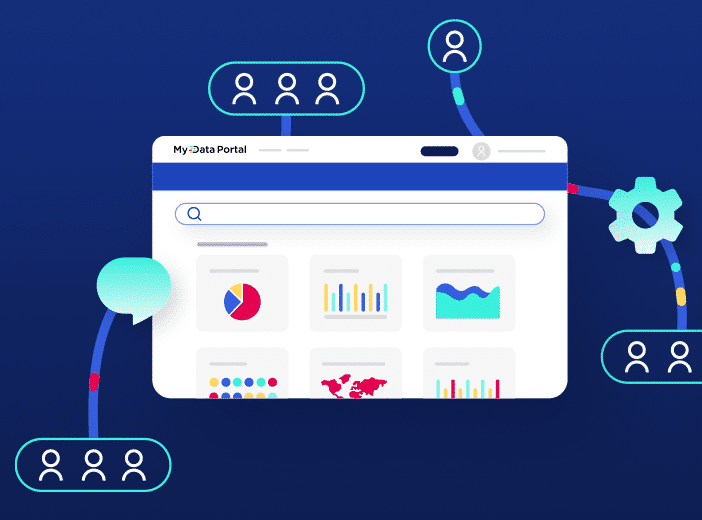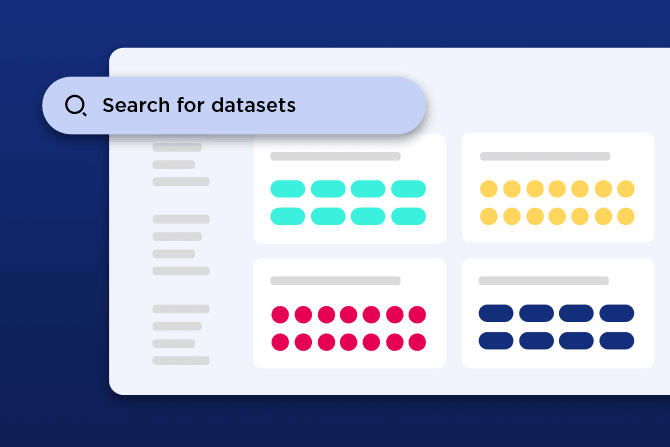Glossary
Artificial Intelligence (AI)
Artificial intelligence (AI) is the simulation of human intelligence processes by machines, especially computer systems.
AI is often associated with science fiction stories where machines replace humans. However, in reality, it can simplify a large number of tasks and even perform actions that were impossible to do manually.
What is artificial intelligence (AI)?
Definition
Artificial intelligence (AI) is the simulation of human intelligence processes by machines, especially computer systems. Essentially it involves computer programs to reason on the same model as a human brain, by focusing on three cognitive skills – reasoning, learning and self-correction.
The objective of AI is either to automate previously manual tasks (increasing efficiency) or to perform more advanced tasks that are too complex for humans to handle, enabling new innovations.
Data is at the heart of artificial intelligence. Machines need to access and ingest the maximum possible amount of information for AI applications such as speech recognition, natural language learning, predictive analysis, machine vision, etc.
Here are some common examples of artificial intelligence:
- Chatbots: Used in customer service to answer consumer queries. Given that the majority of questions cover the same areas, it is easy to understand and answer them.
- Social networks: social media algorithms use artificial intelligence to suggest relevant content to users based on their habits.
- Customer analytics: AI can predict customer preferences, with this insight then used within decision making. For example, it can show when customers are most likely to buy, the best methods of communicating with them, or what will ensure they convert.
The difference between artificial intelligence (AI) and machine learning
Artificial Intelligence and machine learning are often used as synonyms. However, it is important to differentiate between the two terms. Machine learning is only one component of artificial intelligence. It is an iterative learning method that aims to improve the capabilities of the intelligent machine through ingesting vast quantities of training data.
But artificial intelligence is not limited to machine learning. It also covers multiple other methods to mimic the human brain, such as deep learning (or artificial neural networks), speech recognition, and image recognition.
Thanks to all these techniques, intelligent systems are able to integrate a complex cognitive process mixing memorizing information, communication, comprehension, reasoning, adaptation and autonomous learning.
What are the uses and benefits of Artificial Intelligence (AI)?
Artificial intelligence is everywhere, as it provides organizations with multiple benefits:
- Data analysis: tools using AI are able to process larger volumes of data that could not be analyzed by a human being (or even by a complete team). By processing these enormous volumes of data, often from multiple sources, more accurate insights and forecasts are created.
- Continuous improvement: thanks to machine learning, organizations are able to quickly understand possible points of failure, within their products or processes, and correct them.
- Automation: Artificial intelligence enables time-consuming tasks that normally require human intervention to be automated, delivering real productivity gains.
- Fault detection: AI is able to detect failures, whether in terms of security, or processes and recommend immediate actions.
- Competitive advantage: due to more reliable data analysis, companies are able to make better decisions, such as around customer preferences, products to launch or communication channels to use.
- Cost reduction: by limiting the risk of errors and optimizing productivity, artificial intelligence also reduces costs.
Thanks to all these benefits, companies using artificial intelligence can improve their performance exponentially.
How can you use artificial intelligence (AI) in your business?
While artificial intelligence is beneficial to all businesses, it does not work miracles. It relies on access to sufficient volumes of high-quality data. Fail to provide this and the insights produced will be untrustworthy or just plain wrong.
Only by adopting clear processes will you be able to take full advantage of the benefits of AI:
- Strategy definition: there are dozens of AI solutions available for various domains/industries. Rather than immediately buying technology, start by defining your strategy and look at what you want to achieve.
- Pick the right use cases: Understand what you are going to use AI for. Create concrete use cases before deploying it to achieve the best results.
- Data optimization: AI is above all based on data. As such, machines must use reliable, qualitative, up-to-date and relevant information. It is therefore in the interest of organizations to implement a data governance policy to guarantee this.
- Evolution: since artificial intelligence aims to improve human contributions, it must be able to respond to changing business needs. This is why AI solutions must undergo regular maintenance to constantly adapt to changes.
By applying these different practices, you will be able to optimize the potential of AI tools within your organization.
Learn more

3 key collaborative features to engage data consumers with your data portal
How can you break down silos and make data available to everyone within your organization, not just data specialists? How do you get employees to use data effectively in their everyday working lives? This article explains the key features you need on your data portal to engage users and maximize data sharing and reuse.

Accelerating statistical data sharing with SDMX and intuitive data portals
Access to accurate statistical information is key to the successful functioning of the global economy and for policymakers and businesses to make informed decisions around subjects that impact us all. How can institutions effectively and efficiently share their statistical data in an interoperable, scalable way to democratize access and build trust?

